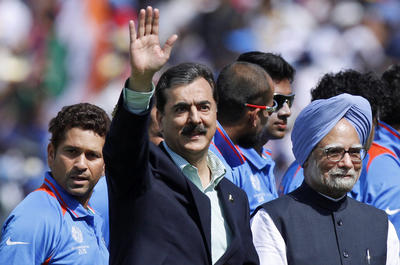While debates on the correct timing of a visit to Pakistan could prove endless, many believe the trip is long overdue for a number of reasons.
First, the Indian prime minister has now been in power for eight years. Improving the India–Pakistan bilateral relationship has been high on his agenda during both his terms in office, and many believe that one of Singh’s major successes has been his engagement with Islamabad. This view has been reinforced by developments over the past year.
Pakistan declared in 2011 that it would grant India most favoured nation (MFN) status. For other countries, bestowing MFN status is nothing extraordinary. But in the context of the New Delhi–Islamabad relationship it is a major leap forward, since earlier civilian governments have always linked this issue to the dispute over Kashmir. Pakistan has already increased the number of commodities being traded between both countries over the past year. There is also demand to open up more land routes for trade, such as the Munabao–Khokhrapar and Hussainiwala–Ganda Singh Wala corridors.
In September 2012, Pakistan’s interior minister, Rehman Malik, and India’s former external affairs minister, SM Krishna, signed a liberalised visa agreement. Under this agreement, citizens from both countries over the age of 65 can be granted a visa on arrival, and businesspeople from both nations can travel more freely between the two countries.
Two Indian state delegations also visited Pakistan in November 2012, and both received a rousing welcome. A delegation from Punjab was led by Deputy Chief Minister Sukhbir Singh Badal, while Bihar chief minister Nitish Kumar led another. Sukhbir’s and Nitish’s parties — Shiromani Akali Dal and Janata Dal (United), respectively — are both part of the BJP-led National Democratic Alliance. The successful visits of these leaders, both from opposition parties, indicate broader consensus for better relations with Pakistan, and should reassure the Indian prime minister.
Despite the reasonable success of Singh’s Pakistan policy, it is important to remember that former prime minister Atal Bihari Vajpayee, a member of the centre-right BJP, also visited Pakistan twice during his premiership. In this context, Singh’s last-minute decision not to visit Pakistan reveals two traits that have been unhelpful to his image: a lack of spontaneity and the inability to take risks when necessary.
Both these traits are imperative for successful diplomacy in South Asia. There is no better illustration of this point than Vajpayee’s trip to Pakistan in 1999 and his offer of a ceasefire in 2003. Both these decisions were spontaneous, but were not easy to make; the former Indian prime minister had to take on hardliners within his own party to see through these decisions.
In the case of Singh, who is extremely popular in Pakistan, he too has been successful whenever he has acted spontaneously. The current re-engagement began when the Indian prime minister suddenly invited Pakistan’s then prime minister Yousaf Raza Gilani to the 2011 world cup cricket semi-final at Mohali. The latter agreed to the invitation and both countries began serious bilateral engagement in April 2011, when commerce secretaries of both countries met in Islamabad. Even outside the realm of India–Pakistan relations, the prime minister has always been successful when he has acted decisively. There is no better illustration of this point than Singh’s effective manoeuvring of the Indo–US nuclear deal in 2008, despite the Left Front walking out of the United Progressive Alliance (UPA) government.
There is no doubt that Singh has to contend with numerous road blocs to his Islamabad policy. First, with lower house elections less than a year and a half away, sections of the Congress party have opposed engagement with Islamabad because they do not want to give the impression that the UPA government is treating Pakistan with kid gloves. As it is, Singh has had a tough time convincing his party about the benefits of recently introduced economic reforms, which many believe could have an adverse impact on the party’s electoral prospects. Second, military and intelligence agencies, displeased that the prime minister is not averse to demilitarising Siachen, may have played a role in scuttling the visit. Third, the prime minister might want to avoid visiting Pakistan because he has been criticised previously for being over-enthusiastic about peace efforts.
While postponing his trip to Pakistan may have been a well-considered decision, Singh must take on the naysayers and make a brief trip at the next opportunity. Paying obeisance at Nankana Sahib, or visiting his birthplace in Gah, Pakistan, may not result in any tangible gains, but they can be seen as important goodwill gestures, and an indication that the prime minister is willing to take on the hawks in the establishment. In any case, the first step toward improved bilateral relations should be spontaneous visits by leaders from both sides. If Vajpayee could take part in the inaugural Delhi–Lahore bus service, there is nothing to prevent the current prime minister from now stepping onto Pakistani soil.
Tridivesh Singh Maini is a New Delhi-based columnist.


RT @east_asia_forum: Manmohan Singh’s Pakistan policy by Tridivesh Singh Maini http://t.co/MmtVmi9X
RT @east_asia_forum: Manmohan Singh’s Pakistan policy by Tridivesh Singh Maini http://t.co/MmtVmi9X
RT @east_asia_forum: Manmohan Singh’s Pakistan policy by Tridivesh Singh Maini http://t.co/MmtVmi9X
RT @east_asia_forum: Manmohan Singh’s Pakistan policy by Tridivesh Singh Maini http://t.co/MmtVmi9X
RT @east_asia_forum: Manmohan Singh’s Pakistan policy by Tridivesh Singh Maini http://t.co/MmtVmi9X
RT @east_asia_forum: Manmohan Singh’s Pakistan policy by Tridivesh Singh Maini http://t.co/MmtVmi9X
RT @east_asia_forum: Manmohan Singh’s Pakistan policy by Tridivesh Singh Maini http://t.co/MmtVmi9X
RT @east_asia_forum: Manmohan Singh’s Pakistan policy by Tridivesh Singh Maini http://t.co/MmtVmi9X
RT @east_asia_forum: Manmohan Singh’s Pakistan policy by Tridivesh Singh Maini http://t.co/MmtVmi9X
RT @east_asia_forum: Manmohan Singh’s Pakistan policy by Tridivesh Singh Maini http://t.co/MmtVmi9X
RT @east_asia_forum: Manmohan Singh’s Pakistan policy by Tridivesh Singh Maini http://t.co/MmtVmi9X